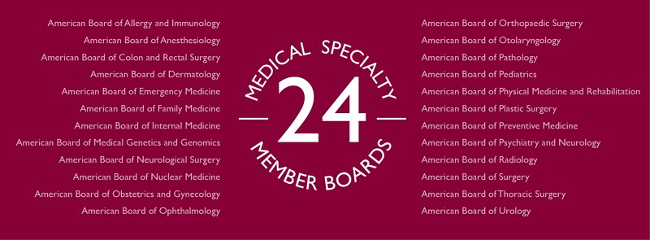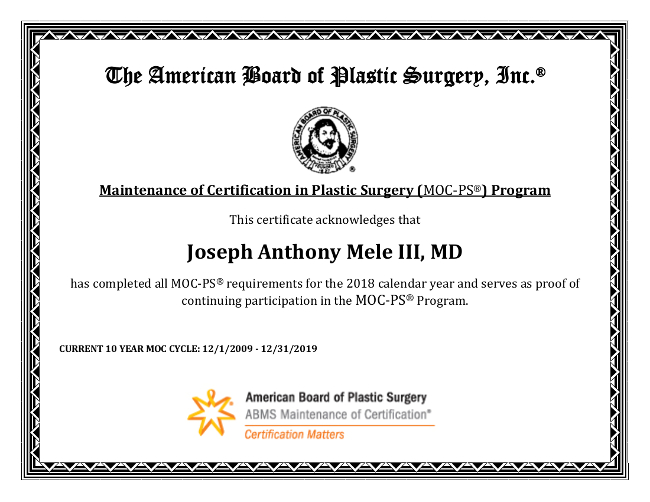
What to ask you Cosmetic Surgeon, before having Plastic Surgery
There are many questions you should ask your Cosmetic Surgeon. By its very nature, Cosmetic Surgery is elective. You should know what to expect from your procedure, before making the commitment. Many lists of questions exist on-line; however, there are five questions you should always ask:
- What Is Your Training?
- How Often Do You Perform The Procedure?
- How Is The Procedure Performed?
- What Is The Recovery Like?
- What Is The Total Cost?
Each of these questions are straight forward, but they are also multifaceted. Over the next few weeks I will expand on the nuances of each question. Today, I am discussing the issue of training.
What Is Your Training?

Training is the foundation for good results, so you should ask your Board Certified Cosmetic Plastic Surgeon about theirs.
It is important to ask about your surgeon’s training. Many types of doctors practice Cosmetic Surgery, and those of us who have dedicated our lives to obtaining the best education and training are happy to get this question. Over the last 20 years of my Cosmetic Plastic Surgery practice, there has been a heightened awareness of Board Certification. Board Certification is important, but it should be a “real” board, and it should pertain to the surgery you are having performed.
Board Certification
The American Board of Medical Specialties is the gold standard for medical boards. The ABMS includes 24 member boards that cover all medical and surgical specialties. Boards outside the ABMS need to be held to the same standards. The following is from the ABMS web site.

The 24 certifying boards or Member Boards of ABMS were founded by their respective specialties to assess and certify doctors who demonstrate the clinical judgment, skills, and attitudes essential for the delivery of excellent patient care.
Board Certification is a voluntary process, and one that is very different from medical licensure. Obtaining a medical license sets the minimum competency requirements to diagnose and treat patients, it is not specialty specific. Board Certification demonstrates a physician’s exceptional expertise in a particular specialty and/or subspecialty of medical practice.
Maintenance of Certification is a system of ongoing professional development and practice assessment and improvement. It challenges physicians to focus on the continuous development of their skill set, especially those skills that enable them to function effectively in interprofessional teams, integrated systems of care and community settings.
The American Board Of Plastic Surgery
The American Board of Plastic Surgery is the only ABMS board for Plastic Surgery, and the only board exclusively dedicated to the performance of safe and predictable plastic surgery. It is important to note that the minimum requirements are the completion of Medical School, 3 years of general surgery training, 2 years of plastic surgery training and the completion of board certification examinations. Since 1995, ongoing yearly maintenance of certification (MOC) is also required (more tests, paperwork and expense). Doctors certified before 1995, are not required to participate in MOC, so you may want to ask if your Board Certified doctor voluntarily participates in MOC.
What Is My Training?
I have spent years more than the minimum required to get the best possible Cosmetic Plastic Surgery training. I also obtain 2 to 3 times the required continuing medical education (CME) units every year, so I am happy to answer questions about my training and qualifications.

The above certificate represents years of training and many weeks of ongoing continuing medical education.
I my case, I chose to become a Board Certified Plastic Surgeon, with specialization in Cosmetic Plastic Surgery. It is the longest training for Plastic Surgeons, and the only training dedicated exclusively to Plastic Surgery.
After college, my training includes medical school, general surgery and plastic surgery training leading to Board Certification in both General Surgery and Plastic Surgery. Here are some more details:
- Four years as a medical student at the University of California Davis School of Medicine in Davis and Sacramento, CA
- One year as a surgical intern at the University of California Davis Medical Center in Sacramento, CA
- Three Years as a general surgery resident at San Joaquin General Hospital in French Camp (Stockton), CA
- One Year as the general surgery chief resident at San Joaquin General Hospital in French Camp (Stockton), CA
- Two Years as a plastic surgery fellow at Saint Francisco Memorial Hospital in San Francisco, CA
- One Year as a plastic surgery chief fellow at Saint Francisco Memorial Hospital in San Francisco, CA
What Is My Board Certification?
That is 12 year of training after college. Three years of general surgery training at the same program are required for admission to a plastic surgery training program. Board Certification in General Surgery is not required. I completed five years of general surgery training, an entire General Surgery residency and Board Certification in General Surgery.
Two years of Plastic Surgery training are required for Plastic Surgery board certification. I completed three years and Board Certification in Plastic Surgery.
Is Training Enough?
Good training is the foundation for a good Plastic Surgeon. Having the appropriate knowledge base is what helps me choose the best procedures for my patients. Knowing multiple ways to accomplish similar goals, gives you options, too. If you would like to explore your Plastic Surgery options, give my San Francisco Bay Area plastic surgery clinic a call today at (925) 943-6353.
Without good training, surgeons become pigeon-holed and have limited options from which to choose. Experience, however, is equally important. Next week’s question, How Often Do You Perform The Procedure?, can help you select a Plastic Surgeon who is both well trained and experienced with the procedure you desire.
Previous Post Next Post